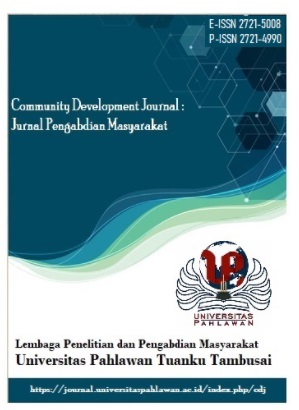METACOGNITIVE STRATEGIES: INVESTIGATING EFL STUDENTS' SELF-EVALUATION OF SPEAKING PERFORMANCE DURING ONLINE LEARNING
DOI:
https://doi.org/10.31004/jrpp.v3i2.1398Keywords:
Self-Evaluation, Speaking Performance.Abstract
This study examines an investigation toward EFL students' self-evaluation in speaking performance to report the metacognitive strategies using during an online class. The participants were 35 EFL students at the English Department of a state university. Self-evaluation is a type of metacognitive strategy in which students assess and measure their work (Amanda Arp, 2016). This study is based on previous research regarding self-evaluation by Amanda Arp in 2016. Researcher using the coding self-evaluation that was adapted from thirty self-evaluations based on the use of descriptive coding (Saldaña). A questionnaire was administered to the EFL students to explore their self-evaluation strategy towards their speaking performance during online classes. The results show that there are almost all participants applied the Metacognitive strategy which is self-evaluation toward their speaking performance during an online classReferences
Ahangari, S., Rassekh-Alqol, B., & Hamed, L. A. A. (2013). The effect of peer assessment on oral presentation in an EFL context. International Journal of Applied Linguistics and English Literature, 2(3), 45–53. https://doi.org/10.7575/aiac.ijalel.v.2n.3p.45
Al-Alwan, A., Asassfeh, S., & Al-Shboul, Y. (2013). EFL learners’ listening comprehension and awareness of metacognitive strategies: How are they related. International Education Studies, 6(9), 31–39. https://doi.org/10.5539/ies.v6n9p31
Ariyanti, A. (2016). Psychological Factors Affecting EFL Students’ Speaking Performance. ASIAN TEFL Journal of Language Teaching and Applied Linguistics, 1(1), 77–88. https://doi.org/10.21462/asiantefl.v1i1.14
Arp, A. (2016). Examining Student Metacognition when Self- Evaluating Public Speaking by.
Asakereh, A., & Dehghannezhad, M. (2015). Student satisfaction with EFL speaking classes: Relating speaking self-efficacy and skills achievement. Issues in Educational Research, 25(4), 345–363.
Çağatay, S. (2015). Examining EFL Students’ Foreign Language Speaking Anxiety: The Case at a Turkish State University. Procedia - Social and Behavioral Sciences, 199, 648–656. https://doi.org/10.1016/j.sbspro.2015.07.594
Djahimo, S. E. . (2018). Student anxiety and their speaking performance: teaching EFL to Indonesian student. International Journal of Social Sciences and Humanities, 2(3), 187–195. https://doi.org/10.29332/ijssh.v2n3.235
Ellis, D., & Zimmerman, B. J. (2001). Enhancing Self-Monitoring during Self-Regulated Learning of Speech. 205–228. https://doi.org/10.1007/978-94-017-2243-8_10
Fazeli, S. H. (2012). Use of the metacognitive English language learning strategies based on personality traits. Theory and Practice in Language Studies, 2(3), 531–539. https://doi.org/10.4304/tpls.2.3.531-539
Harrison, G. M., & Vallin, L. M. (2018). Evaluating the metacognitive awareness inventory using empirical factor-structure evidence. Metacognition and Learning, 13(1), 15–38. https://doi.org/10.1007/s11409-017-9176-z
Hosni, S. (2014). Speaking Difficulties Encountered by Young EFL Learners. International Journal on Studies in English Language and Literature, 2(6), 22–30.
Huisman, B., Saab, N., Van Driel, J., & Van Den Broek, P. (2020). A questionnaire to assess students’ beliefs about peer-feedback. Innovations in Education and Teaching International, 57(3), 328–338. https://doi.org/10.1080/14703297.2019.1630294
J. H. Flavell. (1979). Metacognition and cognitive monitoring: A new area of cognitive-developmental inquiry. American Psychologist, 34(10), 906–911.
Joo, S. H. (2016). Self- and Peer-Assessment of Speaking. Working Papers in TESOL and Applied Linguistics, 16(2), 68–83. http://dx.doi.org/10.7916/D8FN2D1S
Limongelli, C., Sciarrone, F., Temperini, M., & Vaste, G. (2009). Adaptive learning with the LS-Plan system: A field evaluation. IEEE Transactions on Learning Technologies, 2(3), 203–215. https://doi.org/10.1109/TLT.2009.25
Meijer, J., Sleegers, P., Elshout-Mohr, M., van Daalen-Kapteijns, M., Meeus, W., & Tempelaar, D. (2013). The development of a questionnaire on metacognition for students in higher education. Educational Research, 55(1), 31–52. https://doi.org/10.1080/00131881.2013.767024
Oxford. (1989). how well the statement describes YOU. English, 0.
OZTURK, N. (2017). Assessing Metacognition: Theory and Practices. International Journal of Assessment Tools in Education, March 2017, 134–134. https://doi.org/10.21449/ijate.298299
Prof. Ag. Bambang Setiyadi; Ph.D. (2016). LANGUAGE LEARNING STRATEGY QUESTIONNAIRE (LLSQ) A Measurement to Identify Students’ Learning Strategies and Prepare the Success of Learning English in the Indonesian Context (Empirical Evidence). Graha Ilmu, 1–124.
Rahimi, M., & Katal, M. (2012). Metacognitive strategies awareness and success in learning english as a foreign language: An overview. Procedia - Social and Behavioral Sciences, 31(2011), 73–81. https://doi.org/10.1016/j.sbspro.2011.12.019
Robertson, P., & Nunn, R. (2011). How_English_L2_learners_in_China_perceive_and_inte. 13(1).
Savira, S. I., & Laksmiwati, H. (2017). Self-Assessment to Assess Student’s Performance in Academic Task to Improve Metacognition. 118, 80–86. https://doi.org/10.2991/icset-17.2017.14
Schraw, G., & Dennison, R. S. (1994). MAI Tabela 1 MB. Contemporary Educational Psychology, 19, 460–475. https://www.harford.edu/~/media/PDF/Student-Services/Tutoring/Metacognition Awareness Inventory.ashx
Setiyadi, A. B. (2001). Language Learning Strategies: Classification and Pedagogical Implication. TEFLIN Journal, 12(1), 15–28. https://doi.org/10.15639/teflinjournal.v12i1/15-28
Sevilla Morales, H., & Gamboa Mena, R. (2017). Student Self-Evaluation and Autonomy Development in EFL Learning. Revista de Lenguas Modernas, 25, 199–222. https://doi.org/10.15517/rlm.v0i25.27695
Shannon, S. (2008). Using metacognitive strategies and learning styles to create self-directed learners. Institute for Learning Styles Journal, 1(2001), 14–28. http://www.auburn.edu/academic/education/ilsrj/Journal Volumes/Fall 2008 Volume 1 PDFs/Metacognitive Strategies and Learning Styles.pdf%0Ahttp://www.auburn.edu/~witteje/ilsrj/Journal Volumes/Fall 2008 Volume 1 PDFs/Metacognitive Strategies and Learning St
Ünver, M. M., Aydın, B., & Eş, Ş. (2016). A Preliminary Study on Oral Performances of English learners in L1 and L2. Anadolu Journal Of Educational Sciences International, 6(2). https://doi.org/10.18039/ajesi.69829
Xu, W. (2012). A survey on metacognitive strategy use in college oral English study under internet environment-with a case study of Guilin University of Technology. Theory and Practice in Language Studies, 2(7), 1430–1435. https://doi.org/10.4304/tpls.2.7.1430-1435







